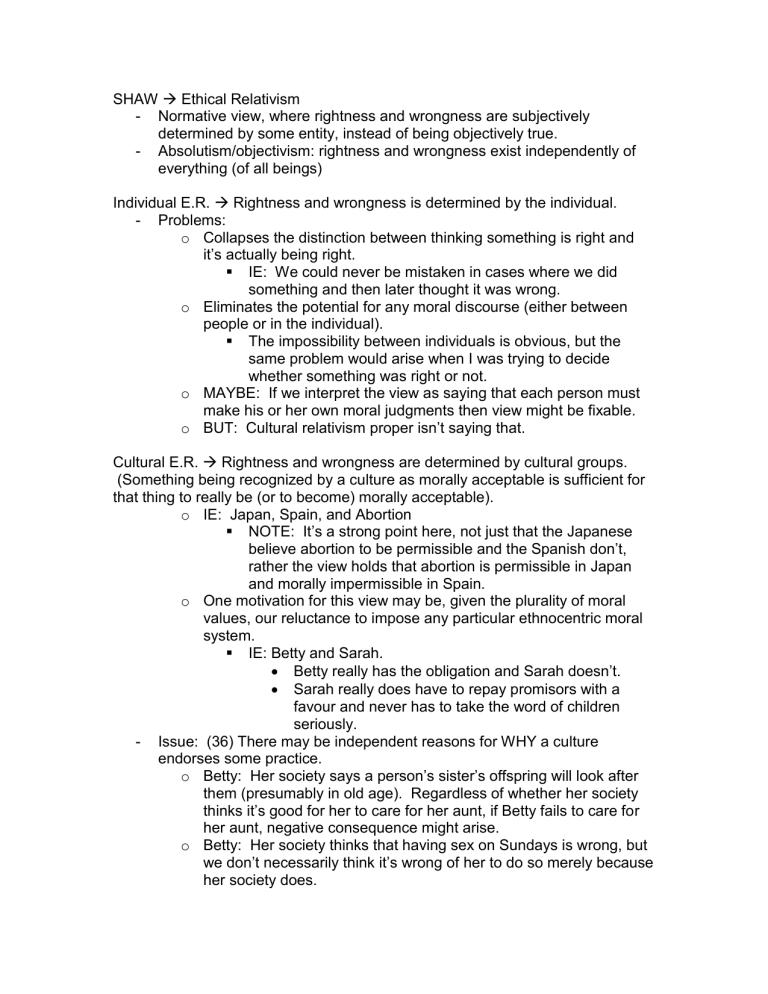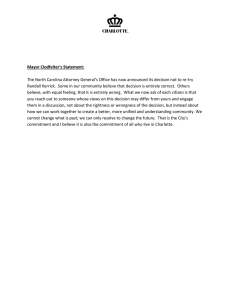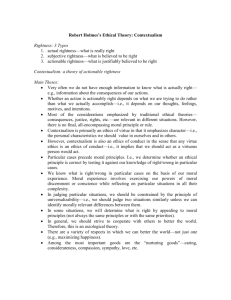SHAW → Ethical Relativism

SHAW
Ethical Relativism
- Normative view, where rightness and wrongness are subjectively determined by some entity, instead of being objectively true.
- Absolutism/objectivism: rightness and wrongness exist independently of everything (of all beings)
Individual E.R. Rightness and wrongness is determined by the individual.
- Problems: o Collapses the distinction between thinking something is right and it’s actually being right.
IE: We could never be mistaken in cases where we did something and then later thought it was wrong. o Eliminates the potential for any moral discourse (either between people or in the individual).
The impossibility between individuals is obvious, but the same problem would arise when I was trying to decide whether something was right or not. o MAYBE: If we interpret the view as saying that each person must make his or her own moral judgments then view might be fixable. o BUT: Cultural relativism proper isn’t saying that.
Cultural E.R. Rightness and wrongness are determined by cultural groups.
(Something being recognized by a culture as morally acceptable is sufficient for that thing to really be (or to become) morally acceptable). o IE: Japan, Spain, and Abortion
NOTE: It’s a strong point here, not just that the Japanese believe abortion to be permissible and the Spanish don’t, rather the view holds that abortion is permissible in Japan and morally impermissible in Spain. o One motivation for this view may be, given the plurality of moral values, our reluctance to impose any particular ethnocentric moral system.
IE: Betty and Sarah.
Betty really has the obligation and Sarah doesn’t.
Sarah really does have to repay promisors with a favour and never has to take the word of children seriously.
- Issue: (36) There may be independent reasons for WHY a culture endorses some practice. o Betty: Her society says a person’s sister’s offspring will look after them (presumably in old age). Regardless of whether her society thinks it’s good for her to care for her aunt, if Betty fails to care for her aunt, negative consequence might arise. o Betty: Her society thinks that having sex on Sundays is wrong, but we don’t necessarily think it’s wrong of her to do so merely because her society does.
o NOTE: The examples are supposed to show that there are other criteria for gauging the morality of an act apart from whether a society endorses it or not.
- Problems: o We can’t have cross-cultural moral judgment, even within the same society over different eras.
IE: Slavery in America o What percentage of a society/culture needs to agree/disagree with the practice?
IE: 90% 75% 51% ?
If the % agreement is set hight (75%) and only 60% of the society thinks that the act is wrong then, although this seems counterintuitive, the practice is permissible even thoug h the majority of the society thinks it’s wrong.
AND: Reformers against some practice can never be right until the majority agrees with them. o What counts as a society?
National identity? State? City? Racial self-identification?
Etc. What happens whe n I’m a member of lots of communities? o We can’t have moral progress.
IE: We could never say where we are now is better than where we were.
QUESTION: Doesn’t it seem like there are some things that are ALWAYS morally wrong, regardless of what a culture says about it?











